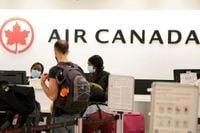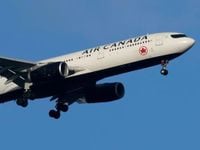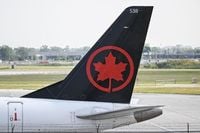After days of mounting anxiety and travel chaos, Air Canada passengers are finally seeing a glimmer of hope as the airline resumes flights following a historic strike by its flight attendants. Early Tuesday morning, August 19, 2025, Air Canada and the Canadian Union of Public Employees (CUPE) reached a tentative agreement, ending the first cabin crew walkout at the airline in nearly four decades, according to The Canadian Press and Al Jazeera.
The strike, which began on Saturday, August 16, 2025, brought the carrier’s operations to a near standstill. With more than 10,000 flight attendants walking off the job, the disruption rippled through airports across Canada and beyond, affecting an estimated 500,000 customers. Travellers were left stranded, frustrated, and in many cases, forced to scramble for alternative ways home or to their destinations. "We were, of course, frustrated," recounted Noha Zaher, whose family endured nearly 60 hours of travel turmoil trying to return to Ottawa after being denied boarding twice in Cairo due to overbooked flights, as reported by CityNews Halifax.
For many, the end of the strike came too late. Arianna Anderson, a 17-year-old from Durham, Ontario, was supposed to join a 10-day Girl Guide trip in the UK. "All of us were so excited to go, and all of us were crushed when it was cancelled," she told CBC News. Travellers like Muhammad Haseeb described epic journeys—four buses and three transfers from Winnipeg to Toronto, followed by 30 hours at Pearson International Airport—just to catch a flight on another airline. Retiree Klaus Hickman, who missed his flight to Toronto and worried about making his connection to Germany, summed up the general mood: "They want to get more money to survive. And so it is with everybody else."
The strike’s impact was immediate and severe. Air Canada operates around 700 flights per day, and as aviation analytics firm Cirium estimated, more than 1,200 domestic and 1,300 international flights were cancelled since Thursday, August 14, 2025. The airline was forced to withdraw its third-quarter and full-year earnings guidance, and shares, while rising 4 percent after the strike ended, had lost approximately 14 percent of their value so far this year, according to Al Jazeera.
So what was at the heart of the dispute? CUPE, representing nearly 10,400 flight attendants, had been negotiating for months over issues including unpaid work, work rules, and what the union described as poverty-level wages. One major sticking point was the lack of "ground pay"—compensation for all the tasks that flight attendants perform before a flight’s doors close and after landing, such as boarding passengers, helping with baggage, and conducting safety checks. "Unpaid work is over. We have reclaimed our voice and our power," CUPE declared in a statement after the agreement was reached. The union noted that a staggering 99.7 percent of its members had voted in favour of the strike.
The standoff escalated sharply over the weekend. On Saturday, August 16, the federal government invoked Section 107 of the Canada Labour Code, pushing both sides into binding arbitration. The Canada Industrial Relations Board ordered flight attendants to return to work on Sunday, but union officials initially defied the order, prompting the board to declare the strike unlawful on Monday. Despite the legal pressure, CUPE pressed on, with national president Mark Hancock vowing, "We’re going to stay strong. We’re going to stay committed to making sure those workers can do the job that they love doing and actually be able to afford a roof over their heads. And if it means folks like me going to jail, then so be it."
Government intervention didn’t end there. Jobs Minister Patty Hajdu announced an immediate probe into allegations of unpaid work in the airline sector, stating, "Nobody should work for free in this country. In fact, we expect to get paid for the work we perform." The union, however, had initially opposed government intervention, fearing it might tip the scales in favour of the airline during negotiations.
By early Tuesday, after a marathon mediation session that stretched from 7 p.m. Monday to 4:23 a.m. Tuesday, both sides emerged with a tentative deal. The agreement, which will be put to a vote among CUPE’s more than 10,000 members, guarantees pay for work performed while planes are on the ground—resolving one of the strike’s central issues. CUPE advised its members to "fully cooperate with resumption of operations."
Air Canada wasted no time in restarting operations, announcing plans to operate more than half of its scheduled flights by the end of Tuesday, August 19. But the airline cautioned that a full return to regular service would take seven to 10 days, as aircraft and crew had been left out of position around the globe. Some flights would remain cancelled during this period, and only customers with confirmed bookings on operating flights were advised to go to the airport. Chief executive Michael Rousseau acknowledged the complexity of restarting a major carrier, urging customers to be patient: "Full restoration may require a week or more, so we ask for our customers' patience and understanding over the coming days."
For those still stranded, Air Canada said customers with cancelled flights could choose between a refund, travel credit, or rebooking on another airline. The airline also made arrangements with other Canadian and foreign carriers to provide alternative travel options, though securing seats during the busy summer season was a challenge. Passengers departing from the EU or UK were entitled to compensation under European regulations, while those originating in Canada were covered by the Air Passenger Protection Regulations. However, under Canadian rules, airlines are not required to provide meals or accommodation during a labour disruption.
Toronto’s Pearson International Airport, Canada’s busiest, deployed additional staff to help manage the resumption of flights. Passengers were repeatedly advised to check their flight status before heading to the airport, as the schedule would remain in flux for days. Travel agents, like Dana Olstead of Migrations Travel and Cruises, described the period as "hectic" and warned clients to expect continued delays. Aviation expert John Gradek of McGill University predicted that resuming international flights would be a "slow process," with crews needing to be repositioned and rested before flights could operate. Still, Gradek doubted the strike would have lasting consequences for Air Canada: "Canadians have a short memory when it comes to aviation disruption. And guess what? Planes are still full."
For passengers who paid out-of-pocket for alternate flights, experts recommended seeking compensation from Air Canada and keeping all documentation for potential travel insurance claims. As the dust settles, the airline and its workers face the challenge of rebuilding trust with travelers who, for a few stressful days, found themselves caught between cancelled flights and a fight for fairer working conditions.
The resolution of the strike marks a significant moment for Canadian labour relations and the aviation sector, but for many weary passengers, the journey home isn’t quite over yet.



